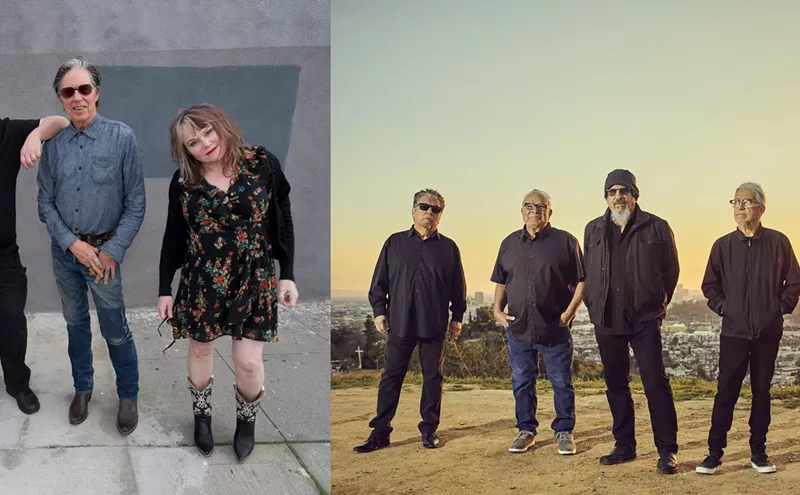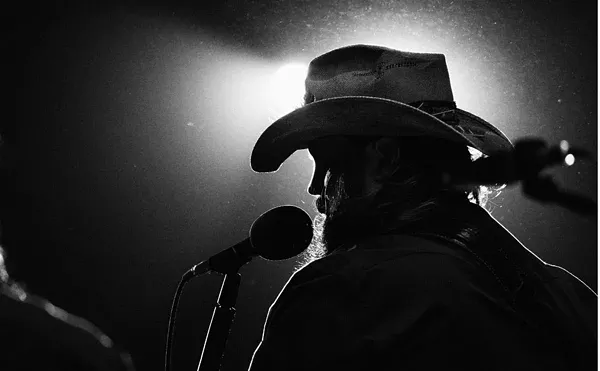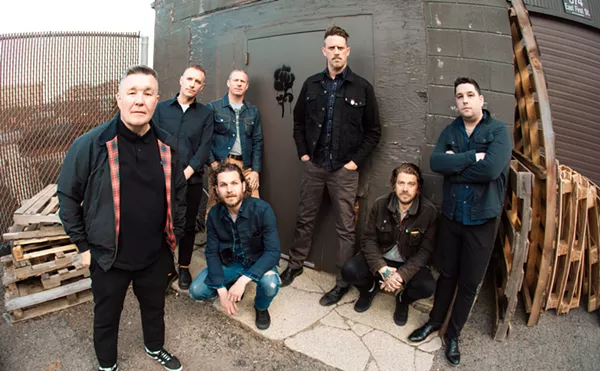"Maybe all I need is a shot in the arm," he sings on Summer Teeth, his third album with Wilco, released in March to much critical -- if not commercial -- acclaim. Elsewhere, he wonders if "Daddy's payday is not enough," and then, abruptly, describes how "she begs me not to hit her."
Maybe the man is just misunderstood. Right now he looks happy enough, like a college boy on holiday with his nylon luggage stacked by the door of one of the many hotel rooms he'll visit during the band's seemingly endless touring schedule. Tweedy is dressed in a hooded windbreaker, his brown hair tousled and short, finishing another pack of Camel Lights. There is no despair in this room, only anticipation for tonight's ninety minutes on stage. Tweedy is, after all, a family man, married with a three-year-old boy. But he has somehow moved to create these songs of sad, desperate love, of bitter isolation, songs that touch a raw emotional nerve -- a kind of repertoire that he first crafted to profound effect on Wilco's second album, 1996's Being There. That two-CD rock-and-roll epic was the sound of a man forgetting what people thought he should be and revealing what he actually is; it was bold and flawed and experimental and honest and often wonderful. And its successor only continues that trend.
"A lot of times when we played the more recent songs live, it would be very emotional for me," Tweedy says. "I would actually cry and embarrass myself on stage." He laughs, a subtle rasp in his voice. "It was embarrassing for the band. I got really emotionally sucked into a lot of songs, and I thought that was a good thing."
His paycheck is enough, but his job still keeps Tweedy on the road and often away from little Spencer, who has been talking lately about calling the police to bring his dad home. Tweedy was close to home for much of last year while writing and recording Summer Teeth, but the sounds and messages emerging from the band's Chicago rehearsal loft would be a threat to anyone's domestic bliss. On the song "Via Chicago," Tweedy muses: "I dreamed about killing you again last night/And it felt all right to me." Words that keep even his wife and close friends wondering.
"They understand, but I'm not saying it doesn't take some work," Tweedy says with a smile. "It can be very, very disturbing. I'm sure a lot of it is still really disturbing to her. Unfortunately, it doesn't ring true to edit those things out, even if they make me uncomfortable. That, to me, is a sign that it's probably the most real thing that you can sing."
Not that Tweedy is obsessed solely with the darker possibilities of pop music. There is an infectious uplift within the self-explanatory "Nothing'severgonnastandinmyway (again)" and elsewhere on the album. But the more troubling stuff -- murder, assault, betrayal, doubt -- comes more easily to Tweedy here.
"It's a lot harder to come to terms with it after," he says. "Do I really want to answer all the questions that are going to be addressed to me about this? Like, no, I've never hit my wife. I don't know why I wrote 'She begged me not to hit her.' It just felt powerful to sing, because it was a way to communicate passion that would actually be understood.
"To me it's about wanting desperately to convey that kind of emotion about someone and realizing that the only people who can piss you off enough to want to hit them are the people you love. That's nothing new."
People never asked Johnny Cash if he really shot a man in Reno just to watch him die, of course, and the real story of Summer Teeth is that these dark passages are set against music of increasing beauty and complexity. Wilco will be forever linked with the Nineties No Depression movement, but the smart country rock Tweedy once played with Uncle Tupelo has faded into a much larger musical identity. Rock and roll raveups are few on Summer Teeth, largely giving way to dreamier pop where horns and banjo tap into the legacy of Brian Wilson's production on "Pieholden Suite." Elsewhere, keyboards have simply usurped the guitar as lead instrument, and the lush harmonies just add another layer of meaning to the often difficult lyrics. There is also a playfulness in the retro space-age pop of "I'm Always in Love" or in the hilarious operatic voice sampled (via a vintage Chamberlin keyboard) throughout "Candy Floss."
"I probably pull my hair out more about lyrics, but the struggle is the whole thing, getting it all to work together," says Tweedy. "It's a great struggle. It's exciting, especially when you get closer and closer. Then a week later, you hate it with every ounce of passion you have in your body."
It has been a central mission for Tweedy to move beyond the alternative country sound of his early career with Uncle Tupelo. That band languished in obscurity for its entire career but was embraced by a small crowd of fans and critics who heard something special and true within its rustic cross-pollinations. Tupelo had its beginnings in St. Louis, where Tweedy and high school friend Jay Farrar first began mixing their passion for American folk and contemporary underground heroes like Dinosaur Jr and Hsker D. But soon after releasing the moving (and, at the time, largely unheard) Anodyne album for Warner Brothers in 1993, Farrar abruptly quit the band. In hindsight, Tweedy sees the breakup as the result of his own increasing excitement and creative ambition, which he says may have been a threat to what had been Farrar's dominant role in Tupelo.
"At the time, it was really sad," Tweedy says. "It was definitely a feeling of rejection when Jay quit the band and sort of hard to swallow, just like anything that has been a part of your life from when you're fourteen on. We started playing together really young. It was part of my identity. I defined myself by that band.
"It was harder and harder for us to communicate. At the same time, I thought we were getting better at it. In hindsight, I realize that Jay did a really good thing for me, too. Anything past Anodyne would have been diminishing returns."
Tweedy had been content with Uncle Tupelo, but when it ended, both he and Farrar were left to either claim the legacy of Tupelo or move away from it. As it stands now, Farrar has done most of the claiming, Tweedy the distancing. While there's an increasingly restless creativity within Wilco's music, Farrar has landed in a place and sound where he's comfortable, a sound that continues his former band's tradition of spirited ruralism. His new band, Son Volt, has created some memorable tracks, cutting deepest the closer the quartet moves toward country. It's serious, well-intentioned and honest. But it's inevitably less surprising and less exciting than the expansive sounds chosen by Tweedy. The two singer-songwriters are now barely in touch, as if their years together, beginning with their first jam sessions in a St. Louis basement, was just a phase they went through.
"We were barely in touch when we lived in the same apartment," Tweedy says. "Jay's a difficult person to communicate with, for a lot of people. But I don't think he's bad guy. Now that it's two different things, it's perceived even more as competition. I don't feel that nearly as much as when we were in a band together.
"You don't really go out of your way to call up people you went to high school with. Parts of your life just kind of fade away, and you don't have a lot to say to each other."
Wilco and Son Volt inevitably share many of the same fans, many of whom discovered the Tupelo legacy only through the acclaimed music of Wilco and Son Volt. And for Wilco's first record, the energetic country rocker A.M., Tweedy went with his impulse to play to his former band's audience. There was a deepening poignancy here, as evidenced in the comical and subtly tragic "Passenger Side," which is told in the voice of an aimless loser, a slave to the bottle, with dreams no larger than his next kegger. But it could have been an Uncle Tupelo record. Part of the reason, Tweedy says now, was fear, a lack of faith in his own vision beyond Tupelo. But with Being There, Wilco demonstrated an interest in bigger themes, a larger sound, a less dogmatic commitment to the venerated tradition of country publishing firm Acuff-Rose.
"It was just an effort to be more honest about what I liked or what we liked as a band," Tweedy says. "It was a reaction in some ways to being called alternative country, and it was a reaction in some ways to being designated the sort of happy-go-lucky, frivolous pop element from Uncle Tupelo -- and Jay was the dark genius. I admit that now. More than anything, I couldn't make a record like that again. I just didn't have it in me."
He hardly needs to, with the various side-projects that keep him busy between Wilco gigs. He's a member of Golden Smog, a sometime collective that includes Tweedy and members of the Jayhawks, Soul Asylum, and others. He appeared on the Handsome Family's fine Through the Trees album, which was recorded with Tweedy's gear. There was also Mermaid Avenue, the high-profile collaboration with Billy Bragg, on which the team put music to previously unrecorded Woody Guthrie lyrics. A second volume of Bragg/Wilco-treated Guthrie material is currently in the works and will be released next year.
But Tweedy's focus rarely drifts too far from the words inside his own head. He has some aspirations of attempting a book of stories or poetry. Bob Dylan may be his core literary influence, but even now he has a short stack of books by the door to his hotel room: anthologies of William Burroughs and Sherwood Anderson, a bio of Jackson Pollack. Whether those books inspire songs or just doubts remains unclear. And that, at least, is unlikely to change.
"There are so many words," Tweedy says. "Who needs any more books? I don't need any more books, and I buy so many of them, you know. You could say the same about songs, I guess."












